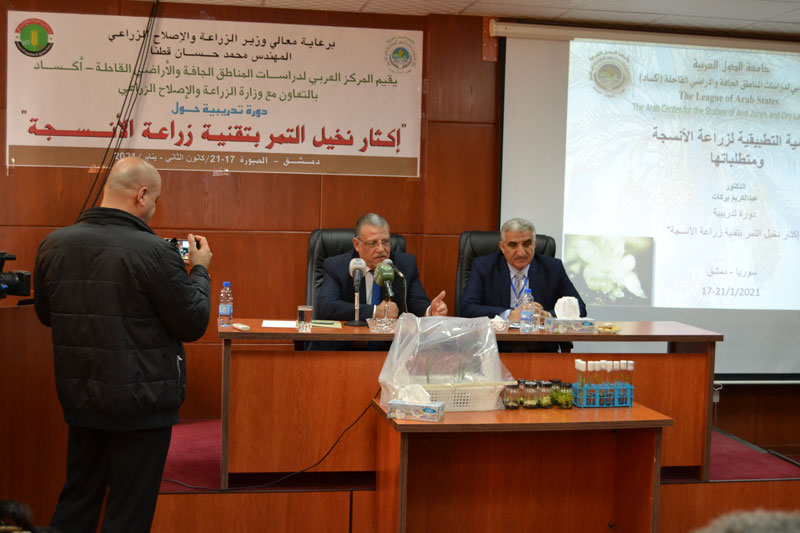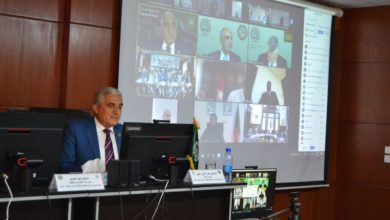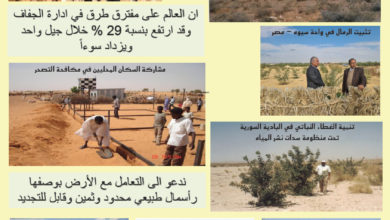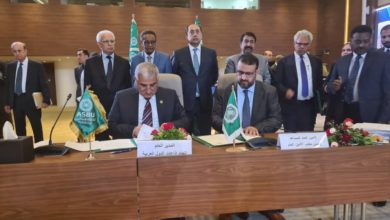ACSAD reaches the particular protocol to propagate date palms histologically.
Today in the headquarters of the Arab Center for the Studies of Arid Zones and Drylands (ACSAD) organization in Damascus, A training course activities in the field of “propagation Date Palm by Tissue culture technology,” and the applied benefits of tissue culture technologies and requirements, the stages of histological propagation of date palms, and the factors affecting their success, diseases, and pests of palm trees; under the patronage of the Excellency Minister of Agriculture and Agrarian Reform of the Syrian Arab Republic, Engineer Mohamed Hassan Qatna.

In a speech at the opening of the training course, the Excellency Minister of Agriculture and Agrarian Reform stressed the importance of cooperation between the Ministry and ACSAD Organization in the areas of joint action, praising the activities that have been doing by ACSAD and the scientific results it has reached, especially in the recent period. In the presence of representatives of FAO organization, the Action Against Hunger- Spanish Organization, the General Commission for Scientific Agricultural Research, the Faculty of Agriculture, the Center for Biotechnology at Damascus University, and a large turnout of Arab experts.
The Excellency Minister referred to the date palm sector’s economic, social and environmental importance, noting that it provided jobs, income-generating products and food industries, handicraft and traditional craft, pharmaceuticals, and fodder ones.
He also stressed the importance of this training course in enhancing and improving the Syrian and Arab scientific and technical cadres’ competence, which would benefit sustainable development processes and projects in the Arab region.
For his part, the Director-General of ACSAD Organization, Dr. Nasr Edin Obeid, said in a speech that ACSAD continues giving studies and scientific research and applied its results the importance that it deserves; as the distinguished house of Arab experience, it seeks to provide new agricultural technologies that serve agricultural development and transfer these results to specialists. And this training course comes in implementation of what ACSAD experts have reached after intensive scientific efforts. This course is an application of the two-years intensive scientific experiments and ACSAD experts’ efforts in ACSAD tissue culture laboratories, where a protocol or method of working was precisely defined for the propagation of the date palm by using the technique of tissue culture method, which is done for the first time in the Syrian Arab Republic.
The Director-General of ACSAD Organization stressed that the Organization is keen to transfer this modern technology to agricultural technicians and experts working in the Ministry of Agriculture and Agrarian Reform to produce healthy and strong-growing palm seedlings with a very high multiplication ratio up to thousands of seedlings; at reasonable financial costs, in order to support the palm trees cultivation in Syria and produce sufficient dates instead of importation that reach millions of dollars annually.
Dr. Obaid noted that the holding of this important training course, which is being carried out in the ACSAD Organization advanced laboratories, comes within scientific cooperation and great coordination between ACSAD and the Ministry of Agriculture Agrarian Reform in various areas of common interest.
The ACSAD organization is holding this training course to benefit specialized cadres from the Ministry of Agriculture and Agrarian Reform of the Syrian Arab Republic. Its activities last for five days, and its scientific applied program also includes intensive practical training in ACSAD advanced laboratories on the methods of date palm tree propagation in the tissue culture technique. In addition to familiarizing participants with the most important problems and obstacles of tissue culture and activating in-depth discussions on various related topics.
The scientific and practical training is conducted by a selected group of specialized experts from the Arab Center organization ACSAD.



